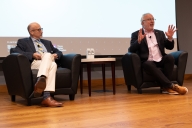You have /5 articles left.
Sign up for a free account or log in.
The battle for campus e-mail and cloud services is becoming a ground war.
Google and Microsoft have been jockeying to insinuate themselves into the hearts and minds of college students by striking deals with colleges and universities to provide free cloud computing services to students — e-mail, mostly, but also other applications that allow students to compose and save work on “cloud” servers located far from campus.
For the most part the sales forces for these companies have tried to court campus administrators in charge of making the buys and negotiating the contracts. But at Princeton University, where administrators are planning to let individual students choose whose software they want to use, the companies have taken their case directly to the people.
Microsoft and Google have been seeding campuses with student advocates for years — Google through its “student ambassador” program and Microsoft with its “students partners” program. For the most part these programs hire students to promote their products via workshops and demonstrations.
But at Princeton this year Microsoft made a splash by becoming the first-ever corporate sponsor of Lawnparties, a twice-annual campuswide party and concert. Held in mid-September, this season’s iteration featured a concert by the band Third Eye Blind. Microsoft, which had a tent there with product demos, helped foot the bill. The company would not say how much it contributed, but the Lawnparties website thanks Microsoft for being “a major player in funding this awesome event.”
The sponsorship comes in the wake of Princeton signing a contract with Google to provide its default e-mail and cloud applications services to students. The university noticed that 40 percent of its students were forwarding their institutional e-mail to private Gmail accounts anyway, says Joe Karam, a senior manager for collaboration services at Princeton. Between that and positive feedback from focus groups last spring, going with Google seemed natural, Karam says.
But while Gmail is the victor in terms of Princeton’s student e-mail, the university said beginning next fall it plans to give students the option of using Microsoft’s Office 365 suite, an array of cloud-based composition tools, instead of the similar tools in Google’s Apps for Education.
The rival companies have largely divvied up the market for third-party e-mail clients (with Google maintaining a slight edge). But the market for other student cloud services is more wide open. Only 15 percent of colleges in the Campus Computing Project’s 2011 survey have already committed to a third party host for “office applications” (compared to 67 percent for e-mail). And the split between Google Apps and Microsoft Office among last fall’s respondents was within the margin of error. Microsoft finally took direct aim at Google Apps in July, unveiling a new, cloud-based Office 365 suite that it is offering to colleges for free.
Princeton is going to allow students to opt-in to Office 365 in 2013, says Karam. Hence Microsoft’s sponsorship of Lawnparties, a popular outdoor extravaganza that the company determined would be a good place to evangelize its homework software.
“If you polled a hundred students, there’s going to be a good chance that many of them are unaware that they have access to this product for free, so we’re really trying to get students aware of the fact that they have this option,” Dave Zamborsky, an account manager for Microsoft, told the Daily Princetonian, a student newspaper.
It might actually work, too. Although Google is widely seen as the hipper of the two software giants, a survey last fall by the market research firm Student Monitor found that students still prefer Microsoft Word to Google Docs for writing papers.
Microsoft does not currently have a “student partner” at Princeton, according to a company spokeswoman. That gives Google the advantage, at least for now, of boots on the ground: Josh Giles, a senior, serves as a student ambassador for the company at Princeton. Google flew him and other student ambassadors to its own “campus” in Silicon Valley over the summer for training. There, Giles says, he was told stories about other ambassadors who earned their stipend by leading successful lobbying efforts to get their administrations to adopt Google Apps.
After Microsoft sponsored Lawnparties earlier this month, Giles says he contacted his handler about having Google sponsor some similar event. The company was receptive to the idea, he says.
For the latest technology news and opinion from Inside Higher Ed, follow @IHEtech on Twitter.








